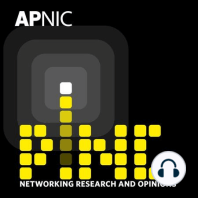43 min listen
How much buffer is enough?
FromPING
ratings:
Length:
65 minutes
Released:
May 10, 2023
Format:
Podcast episode
Description
In this episode of PING, APNIC's Chief Scientist Geoff Huston discusses the question of buffers, flow control and 'efficient' use of a network link.
How do we maximise the use of a given network path, without knowing everything about its size along the way? It turns out, the story isn't as simple as "more is better" because sometimes, adding more memory to the system adds delay. Modern TCP's flow control algorithms are being modified to react to delay as well as loss, and become more efficient at occupying the available space. At the same time bit-marks inside the IP packet are modifying how end hosts can react to signals of congestion along the path. Are these two mechanisms in conflict? how do they stack up, and achieve critical mass in deployment?
Read more about TCP and flow control on the APNIC Blog.
Here's some articles from the blog which discuss the issues:
Comparing TCP and QUIC (Geoff Huston)
Does TCP keep pace with QUIC? (Konrad Wolsing)
Striking a balance between bufferbloat and TCP queue oscillation (Ulrich Speidel)
TCP initial window configurations in the wild (Jan Rüth)
Underload: The future of congestion control (Safiqul Islam)
Beyond bufferbloat: End-to-end congestion control cannot avoid latency spikes (Bjørn Teigen)
Congestion Control at IETF 110 (Geoff Huston)
The views expressed by the featured speakers are their own and do not necessarily reflect the views of APNIC.
How do we maximise the use of a given network path, without knowing everything about its size along the way? It turns out, the story isn't as simple as "more is better" because sometimes, adding more memory to the system adds delay. Modern TCP's flow control algorithms are being modified to react to delay as well as loss, and become more efficient at occupying the available space. At the same time bit-marks inside the IP packet are modifying how end hosts can react to signals of congestion along the path. Are these two mechanisms in conflict? how do they stack up, and achieve critical mass in deployment?
Read more about TCP and flow control on the APNIC Blog.
Here's some articles from the blog which discuss the issues:
Comparing TCP and QUIC (Geoff Huston)
Does TCP keep pace with QUIC? (Konrad Wolsing)
Striking a balance between bufferbloat and TCP queue oscillation (Ulrich Speidel)
TCP initial window configurations in the wild (Jan Rüth)
Underload: The future of congestion control (Safiqul Islam)
Beyond bufferbloat: End-to-end congestion control cannot avoid latency spikes (Bjørn Teigen)
Congestion Control at IETF 110 (Geoff Huston)
The views expressed by the featured speakers are their own and do not necessarily reflect the views of APNIC.
Released:
May 10, 2023
Format:
Podcast episode
Titles in the series (45)
QUIC and not so complex: We’re continuing the theme of our last episode and learning more about the intricacies and perceived complexities of the QUIC protocol from one of its contributors and proponents Robin Marx, a web protocol postdoc researcher at KULeuven in Belgium and ... by PING
